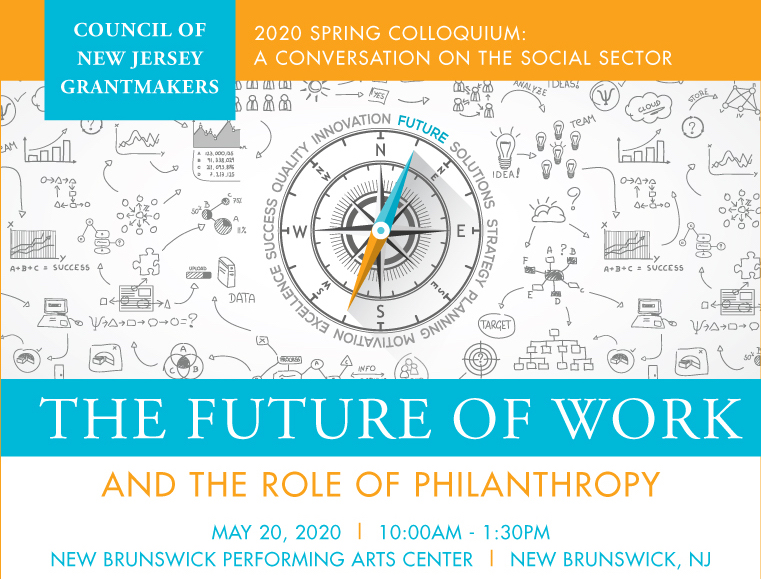Site Search
- resource provided by the Forum Network Knowledgebase.
Search Tip: Search with " " to find exact matches.
In the third session of Putting Racism on the Table (2016), Julie Nelson, Director of the Government Alliance on Race & Equity, Haas Institute for a Fair and Inclusive Society, focused on implicit bias. We encourage check out the viewing guide and discussion guide to be used with the video.
Watch the video
The Future of Work and the Role of Philanthropy
Date: This event has been postponed.
After much consideration and in light of the ongoing spread of coronavirus, CNJG has decided to postpone the 2020 Spring Colloquium, entitled The Future of Work and Philanthropy’s Role.
This was a difficult decision, but the health and safety of attendees and staff are of the utmost importance at this time. It is especially significant because our communities--and indeed our state--rely so heavily on the services and programs made possible by New Jersey’s foundations and charitable organizations. We do not want to do anything that could impede the good work being done by our philanthropic and nonprofit staff, leaders and stakeholders.
We are tremendously grateful to PSEG, our Signature Sponsor, for their continued support, and thank the CNJG Program Committee for their thoughtful guidance and ongoing assistance.
From forest fires in Canada and Greece to massive floods in Vermont and California – not to mention scorching heat waves across the globe – recent events underscore the fact that climate disasters are an inevitable part of our future. It is estimated that over 2 billion people will be at risk of exposure to intense heat by the end of the century. Here in the U.S., the Census Bureau indicates that one in four residents are socially vulnerable to extreme heat waves. In the U.S., people of color are disproportionately impacted by climate change due to their occupations. Non-citizens and Latino workers, who make up more than 75% of agricultural workers, are twenty times more likely to die from heat-related illnesses than the general population. Meanwhile, Black people are 40% more likely to live in areas with the highest estimated increases in mortality rates due to changes in temperature.
Regional inequities also play a role in which parts of the U.S. will be most impacted by climate change. Geographies that naturally have hot climates, such as the Southeast U.S. region, will only get hotter. According to a new index created by Texas A&M University and the Environmental Defense Fund, those who reside in that region will be most susceptible to future climate disasters. These vulnerabilities are exacerbated by a lack of political will which makes it challenging to implement comprehensive long-term strategies that meet the needs of diverse communities.
However, there is still time to prevent the worst impacts of climate change. Climate justice leaders and organizations are working tirelessly to develop the social and economic infrastructure needed to help protect the communities most at risk of experiencing the worst effects of environmental disasters. Join us for a timely discussion with experts from the climate justice movement on their strategies for building climate resilience in the South and learn how philanthropy can invest in transformative solutions to lessen the harms of climate change on immigrant and BIPOC communities.
There is no cost to attend for CNJG members.
The Emergent Fund, Funders for Justice, and Funders for LGBTQ Issues present this webinar which features Mickaela Bradford, Malachi Garza, Ola Osaze, and Monserrat Padilla and moderated by Aldita Amaru Gallardo, Soros Equality Fellow.
Philanthropy has the opportunity to invest in trans/queer communities of color who are transforming pain into power. This is an opportunity to join trans and queer resource mobilizers for this conversation with movement funders in public and private foundations who are committed to building trans power. Learn more about the Action for Transformation Fund and how philanthropy can be in alignment with trans/queer communities of color in a sustainable way.
We are pleased to share the 2022 Newark Philanthropic Liaison Report to the Field. The role continues to demonstrate meaningful impact in Newark while serving as a model to other cities and states across the country interested in deepening the intentionality of public-private partnerships.
Sample board committee descriptions, including roles and responsibilities of committee members

